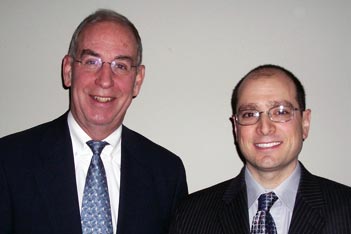Grassroots Quality Improvement:
A Regional Effort in Vascular Surgery

Jack Cronenwett, left, and David Urbach
Quality improvement
is elusive in individual
surgical practice because
variations are hard to
recognize; the number
of events such as deaths
or major complications
over an extended
period of time is small
for a single practitioner.
Professor Jack
Cronenwett, Chief of
Vascular Surgery at the Dartmouth-Hitchcock Medical
Center presented a fascinating solution to this problem
at the University Department of Surgery Clinical
Epidemiology rounds at Sunnybrook. He reviewed
the Vascular Study Group of Northern New England's
remarkably effective regional approach. The Group has
been able to pool the experience of fifty vascular surgeons
working in eleven hospitals. They have now accumulated
data on more than 10,000 patients with 86% follow-up
at one year. This data set was developed by a cooperative,
collegial sharing of information and advice among the
surgeons. They were able to develop uniform definitions,
one-page data forms and a system for comparing outcomes
and processes of care in the treatment of abdominal
aortic aneurysms, carotid endarterectomy, lower extremity
bypass, and more recently, carotid stents. Like the
Northern New England Cardiovascular Disease Study
Group (1) they lowered the incidence of mortality and
complications of the Group as a whole to levels that rival
those reported anywhere. For example, the mortality for
abdominal aortic aneurysms is 2.9% for open procedures
and 0.4% for endovascular stents. They raised the usage of
preoperative beta blocker treatment to above 90% within
12 months of initiating a quality improvement cycle for
this care process. Similar results have been achieved with the use of statins and the use of patches for carotid endarterectomy.
|
Current projects include a drive to reduce complications, and the development of a risk-adjusting and predictive tool to guide preoperative assessment and patient selection. For example, the combination of an elevated creatinine, chronic obstructive pulmonary disease, age greater than 70 and the need for suprarenal clamping, predicts a one year mortality of 70% in patients after elective open abdominal aortic aneurysm repair.This profile would dissuade most patients and surgeons from an open operation. Identifying and disseminating best practices and sharing of sophisticated data, including CT scans for collegial consultation, are current projects designed to improve the outcome for the entire cooperative group. Key lessons from this experience include the need for a physician leader at each site, the need for an overall project leader, the value of a regional rather than a national group to increase collegiality, communication and trust, and the need for a designated data manager at each site.
In the discussion period following the presentation,
we learned that the quality improvement data, legally
protected from discovery, has not resulted in malpractice
litigation. Dr. Cronenwett, who followed Wayne Johnston
as the editor of the Journal of Vascular Surgery, is clearly a
dynamic leader in this area of practical, clinical research.
He showed us his own data and how exposure to the
pooled data of the group stimulated him to improve his
use of beta blockers preoperatively. The data are otherwise
anonymized so that individual surgeons or sites can learn
where they stand with reference to the overall group, but
are not generally informed about the results of other individual
members of the group. The level of trust and collegiality
is sufficiently high now that the group is sharing
"naked data" in which hospitals are identified in the shared
reports to inform discussions about best processes of care.
An earlier publication provides excellent discussion of
the methods and accomplishment of this group.(2)
M.M.
(1) O'Connor GT, Plume SK, et al. A regional prospective
study of in-hospital mortality associated with coronary
artery bypass grafting. The Northern New England
Cardiovascular Disease Study Group. JAMA Aug. 14,
1991;226(6):803-809.
(2) Cronenwett JL, et al. A regional registry for quality assurance
and improvement: The Vascular Study Group of
Northern New England (VSGNNE). Journal of Vascular
Surgery. Dec. 2007;46(6):1093-1102.s
|